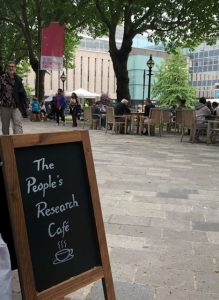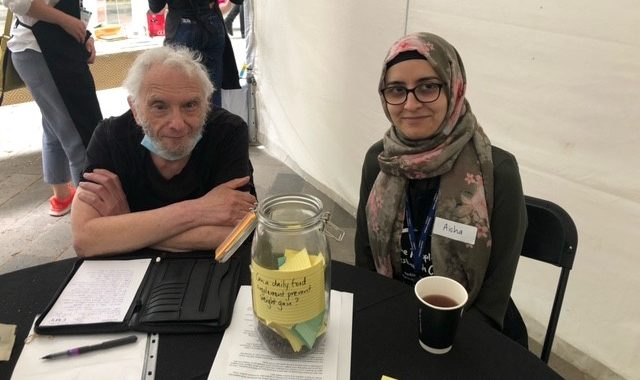- Understanding the relationship between diet and gut health
- Understanding the impact of digital technologies on patient safety
- Developing an alternative to blood tests for health investigation through a microneedle biosensor device
- A coffee for your thoughts: How and when can we personalise medicine?
- Analysing patient feedback to improve patient-centred care
- Artificial Intelligence in healthcare: exciting but complex
- Can a daily food supplement prevent weight gain?
- Developing a new technology to diagnose a virus that can lead to disabilities in new born babies
- A great day on Great Exhibition Road!
- Bringing together experts in public involvement, researchers, public partners, and the public to improve early-stage research projects
- Understanding the role of gut hormones on appetite and eating behaviour
This blog is part of a series showcasing the People’s Research Cafe which took place on the 18th and 19th June 2022 in South Kensington, London as part of the Great Exhibition Road Festival.
What is a People’s Research Café?
The People’s Research Cafe is a café with a twist. Visitors are welcomed to sit down at a table co-hosted by an Imperial College researcher and a public contributor whose role is to help the conversation flow freely. Over a free hot drink, visitors find out about the researcher’s project and will be asked for their opinions on it. The researchers are then expected to use this feedback from visitors to improve their projects. The People’s Research Café has been run previously at two Imperial Festivals (2018 and 2019) and also in four community venues. It was previously called the “PPI Café” and you can read about the one at the Imperial Festival 2018 here.
When did this People’s Research Café take place?
A People’s Research Café was hosted at the Great Exhibition Road Festival held on 18 and 19 June 2022 and was a collaboration between the following teams/centres: Imperial Biomedical Research Centre, Imperial Clinical Trials Unit, Imperial Clinical Research Facility, London In-Vitro Diagnostics Cooperative, North West London Applied Research Collaboration, MRC Centre for Environmental and Health, HPRU in Healthcare Associated Infections and Antimicrobial Resistance. Researchers from each centre were given the opportunity to apply to host a table at the Café for 2 hours where they would explain their research in plain language and ask visitors 3 questions with the help of a public contributor. It was a requirement that the research project was at a stage where visitor feedback could still influence the project. Researchers and public contributors were offered training about how the Café would work and how to maximise conversations with visitors. Ahead of the Café, researchers refined their plain language summaries and three questions to pose to visitors with the help of public involvement leads and a public contributor.
In conversation with: Aisha Anjum, Clinical Trial Manager/Monitor, Imperial Clinical Trials Unit
What research project did you bring to the People’s Research Café and what is it about?
The project that I brought to the People’s Research Café is a clinical trial (a research study involving humans) called iPREVENT. It’s a study which aims to understand the effects of a particular food supplement (something added to the diet) on prevention of weight gain. In previous studies, it has shown to reduce appetite and reduce weight gain.
We have recruited 270 people to take part in our study (we call them participants). They are aged 20-40 years, across London and Glasgow, who have a BMI of 25-30kg/m2 (overweight) and are at risk of gaining more weight. Participants were advised not to change their diet and lifestyle or start intense exercise while part of the study.
The food supplement is a small packet (sachet) of 10g powder (either with the ‘active’ ingredient we are interested in which is called Inulin Propionate Ester, or the placebo ‘control’ which is Inulin fibre alone). The supplement is taken once a day in a cold drink/water, for 12 months.
Just to note, a placebo is something that has no effect, it is used to compare against an active ingredient, to see if there is really an effect. We call this the ‘control group’. Participants were randomly put into one of these two groups by a computer, like rolling a dice.
More than half of participants have completed our study and remaining participants are still being followed up. We have also had about 30% of participants who stopped taking the food supplement for various reasons including inconvenience, stress, texture, bloating etc.
Once we have finished this study we hope to do further research and we therefore wanted the public’s opinions on a few things.
What questions did you ask visitors to the People’s Research Café about your project?
The questions I asked visitors were:
- How concerned are you about weight gain as you get older? Are you more concerned about preventing weight gain or about losing weight if you were to become overweight?
- Which things do you personally feel are important when it comes to managing weight? L(i.e. exercise, diet, taking food supplements, having time to do these)
- If you were to take a food supplement for a long time, which things would matter to you the most? (i.e. taste/flavour/texture, how it’s taken i.e. liquid/tablet/snack, how often you have to take it, cost, side effects)

What did visitors tell you?
We had approximately 10 visitors in total.
Overall, in response to the first question, people were either not concerned about their weight as they weren’t overweight currently, were aware of having a high metabolic rate, would worry about it once they get older or would think about losing weight once overweight, rather than trying to prevent weight gain beforehand. A couple of people mentioned that they cared more about having a healthy lifestyle in general rather than focusing on weight itself and that it would only bother them if they could see negative effects such as getting out of breath whilst walking up stairs.
In response to the second question, people felt that factors such as diet, nutrition, energy, ability to cook, affordability of good food, education, exercise, stress, work, sleep, mental health, eating mindlessly and what the government do to help, were important when it comes to managing weight. One view was that maintaining weight is easy if you have time for things like meal prepping. Other views were that managing weight depends on the reasons why you may have put on weight in the first place and that although diet and exercise are the main things for maintaining weight, stress and mental health determined the effort we put into those things. Someone also mentioned that we need to try to understand systematic problems behind weight gain, such as poverty, lack of education and access to help for managing weight. One person felt taking an appetite suppressant was important for managing weight.
For the third question, some people expressed that they’d prefer not to take an appetite suppressant long term either due to side effects (including long term effects on health or the body, as well as effects of stopping it) or inconvenience. Others wouldn’t mind taking a food supplement and already did or had done as they were vegetarian. They said frequency and how it’s taken mattered, for example taking a supplement only once a day with no time restriction was convenient, taking a pill was more convenient than a powder and other factors like taste, cost, what it contains and amount taken also mattered. One person mentioned it was important to see observable results and someone added that cost would be important if it had to be taken for a long time before seeing an effect on weight.
Having discussed the possibility of putting our project’s food supplement in every day foods such as bread and cereal, there was a split opinion. Some people did not like the idea of not having the choice/control of taking the food supplement separately, whilst others felt it would be more convenient as it took the burden off of having to think about it.
There was some concern that a food supplement for managing weight might be exploited by people with eating disorders, that it would mean you can’t manage weight without the food supplement in future, or that it would encourage people to keep their bad lifestyle habits the same. It was also mentioned that an appetite suppressant may cause you to lose the pleasure of eating and this may lead you to only want to eat unhealthy things when you do eat.
How will what visitors told you impact and/or change your project?
Although our study is not directly impacted (we won’t be changing the way we do things for our project) by feedback from the visitors we had (as we are in the follow up phase), it may help us with future related research. For example if results of our study are positive we may need to do a bigger study, and feedback from the third question may help us create a food supplement that is more appealing to consume.
Feedback from the first two questions may help us understand some barriers or issues in our current study, for example the level of concern people have about their weight or other priorities in life may help explain why we had more participants who stopped taking the food supplement, than expected. It may also help us understand why we found it challenging to find/recruit participants to our study in general.
What was your personal experience of taking part in the People’s Research Café?
Overall, I enjoyed being part of the Research Café. There were several visitors and some were more curious or willing to discuss in more depth than others. The visitors were mostly young people (students) who weren’t overweight so may not have represented the views of people taking part in our study. They were educated, aware, motivated and conscious of their lifestyle, so again this may not reflect the participants of our study (who do low/no exercise or have poor diets and are not doing anything to manage their weight) and the population who struggle to manage their weight and/or lifestyles.
I was asked on several occasions why our study is focusing on a food supplement rather than on lifestyle factors and societal issues. I think there’s still a misunderstanding amongst the public about the extent of weight management issues and numerous factors that affect this, that are a barrier to the quality of people’s lifestyles and a barrier to managing weight successfully in the long-term. I tried my best to explain the background of the study and need for our potential food supplement (the obesity crisis we are facing in the UK, the many weight-related diseases/conditions that continue to increase, the increasing burden and cost to the NHS, long term weight-loss and maintenance being proven mostly unsuccessful etc.) and hope that I was able to shed some light!
